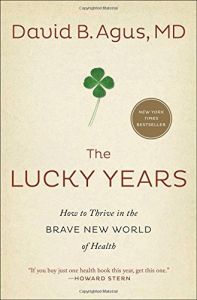Join getAbstract to access the summary!

Join getAbstract to access the summary!
David B. Agus MD
The Lucky Years
How to Thrive in the Brave New World of Health
Simon & Schuster, 2017
What's inside?
Take charge of your health care to be healthier and live longer.
Recommendation
Cancer specialist David B. Agus, MD, calls the 21st century “the lucky years” because this unprecedented era offers so much potential in health care and because people live longer than at any time in history. Agus discusses new developments in research, technology and health care, and offers practical advice for preventing disease. He explains how to make better health decisions in the face of information overload. His more theoretical earlier chapters discuss scientific research, technology and medical history. Later chapters offer practical suggestions for managing your health care. Agus covers solid preventive strategies, such as getting enough sleep and exercise, and embracing the benefits of sex and touching. getAbstract recommends Agus’s advice to anyone seeking to live a longer, healthier life.
Summary
About the Author
Dr. David B. Agus is a professor at the University of Southern California’s Keck School of Medicine and its Viterbi School of Engineering. He also leads USC’s Westside Cancer Center and the Center for Applied Molecular Medicine. He wrote the bestsellers The End of Illness and A Short Guide to a Long Life.

















Comment on this summary